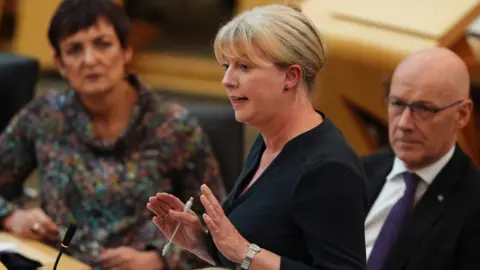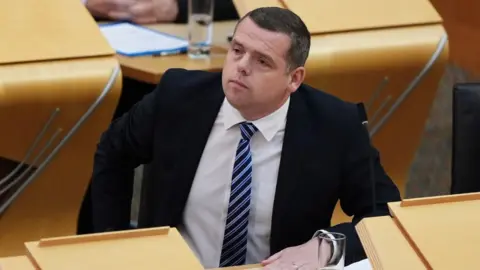The Scottish government has ditched an unfulfilled commitment to expand free school meals to all primary school pupils.
The promise to expand eligibility to all pupils in primary six and seven was made in last year’s programme for government.
This year’s document said funding will be targeted at expanding the benefit only to P6 and P7 pupils whose families are in receipt of the Scottish Child Payment.
A Scottish government source said the intention remained to expand the policy to all pupils when financial circumstances allowed, though they were unable to say when that might happen.
Opposition leaders accused the first minister of being “out of ideas”.
‘Complete betrayal’
First Minister Swinney said his first programme for government – which came a day after his finance secretary Shona Robison announced £500m of cuts – showed his commitment to eradicating child poverty.
Although the SNP leader said his administration was facing “incredibly challenging” financial conditions, he vowed to invest £1bn in childcare, reduce NHS backlogs and deliver public service reform.
The programme for government included a pledge to extend free school meals – which are provided for all pupils in P1 to P5 – to P6 and P7 youngsters who receive the Scottish Child Payment.
However, in last year’s announcement – made by then first minister Humza Yousaf – the government had said it was aiming for a “universal” rollout of the benefit.
Scottish Greens education spokesperson Ross Greer said the government had made the wrong choice by dropping the commitment, while STUC general secretary Roz Foyer called it a “complete betrayal”.
Mr Swinney – announcing his first programme for government since becoming first minister in May – said tackling child poverty was the government’s “first and foremost” priority.
He also said his administration would aim to build prosperity, improve public services and protect the planet.
The SNP leader U-turned on a cut to arts funding, pledged new rent controls to protects tenants and vowed to strengthen the ministerial code.
He said the government’s proposals would be “affordable, impactful and deliverable”.
“Together, they reflect my optimism, that even though we face an incredibly challenging set of circumstances at this moment, the inherent strengths of Scotland, our people and our communities, can create great possibilities for our country,” Mr Swinney told MSPs.

 PA Media
PA Media
The government announced it would introduce 14 new bills – including proposed legislation on climate change, building safety, misogyny, the natural environment and education reform.
Mr Swinney said “difficult decisions” had to be made due to UK government austerity and “sky-high” inflation.
The government vowed to bring forward a Heat in Buildings Bill, which would prohibit the use of some heating systems after 2045 and require some properties to meet a minimum energy efficiency standard.
And Mr Swinney said ministers would introduce proposals for rent controls in stage two of the existing Housing Bill “to ensure that tenants have the protection they need”.
Other plans included 210,000 more outpatient appointments and 20,000 more orthopaedic, ophthalmology and surgery appointments within the NHS.
The first minister also promised faster planning decisions for renewable energy projects.

 PA Media
PA Media
Scottish Conservative leader Douglas Ross described the announcement as “a list of empty platitudes by an SNP government that is out of ideas and out of money”.
Scottish Labour leader Anas Sarwar said it was “out of ideas to deal with the crisis Scots face”.
John Dickie, director of the Child Poverty Action Group in Scotland said the government was taking the right approach, citing the Scottish Child Payment.
But he warned ministers were “falling behind in resourcing the childcare, housing and employment actions that government has already committed to and that families so desperately need”.
Mary Glasgow, chief executive of charity Children 1st, welcomed the government’s commitment to tackling poverty, adding: “But we are deeply concerned that the drastic cuts to public spending will throw many children and families already in crisis over the edge.”
Arts funding U-turn
The government has announced a series of cuts in recent weeks, with Ms Robison telling MSPs there was an almost £1bn black hole in public finances as it reallocates funds to pay for public sector pay deals.
Ministers had faced a backlash from artists – including some of the country’s top musicians – after Creative Scotland announced a major fund would be closed to new applications due to uncertainty over government cash.
But Mr Swinney told parliament the arts body would receive the cash it needs to continue the Open Fund for Individuals.
It followed criticism from performers including Franz Ferdinand and Lewis Capaldi.
Mr Swinney also pledged to overhaul the rules which govern the conduct of ministers.
The early part of the first minister’s reign was marred by a scandal surrounding former health secretary Michael Matheson, who was given a record Holyrood sanction after racking up an £11,000 bill on a parliamentary iPad while on a family holiday.
Mr Swinney said the ministerial code, which is to be published by the end of the year, will allow independent advisers to initiate investigations into the conduct of ministers, as opposed to requiring the first minister to call for a probe.
“I want my government to set the highest standard of propriety and integrity,” the SNP leader said.
Conversion therapy row
Following the announcement, the government was criticised by LGBTQ+ groups for altering its commitment to end conversion practices.
A public consultation on laws to ban conversion therapy for sexuality or gender was held earlier this year.
Holyrood ministers said they wanted to “lead the way” on a ban after the former Conservative UK government had not acted on a pledge made five years earlier to end the practice.
But in this year’s programme for government, ministers said they aimed to progress commitments to end conversion practices “should a UK-wide approach not be achievable”.
Scottish Greens equalities spokesperson Maggie Chapman MSP said: “For three years, the SNP has been promising people that a comprehensive Scottish ban would be introduced and many will be devastated that they are going back on their word and kicking the can further down the road.”


The question of whether to provide free school meals to all children – or just those whose families are on low incomes – gets to the heart of the debate on universal benefits.
Just who is being helped if something is free for all? Does it help fight poverty or provide a freebie for people who do not need state help?
Free school meals for all children in P1 – P3 were introduced in 2015 following a similar move by the Westminster government in England.
The Scottish government later widened eligibility to include all children up to P5.
Supporters argue that providing free meals to all children in a class helps ensure there is no stigma for low income families who would otherwise have had to claim for them. They would also argue that there are also families on tight budgets who would not qualify for targeted help.
But opponents would claim universal free school meals are also a “middle class benefit”. A freebie for comfortably off families which diverts resources that could be used to support low income families.










